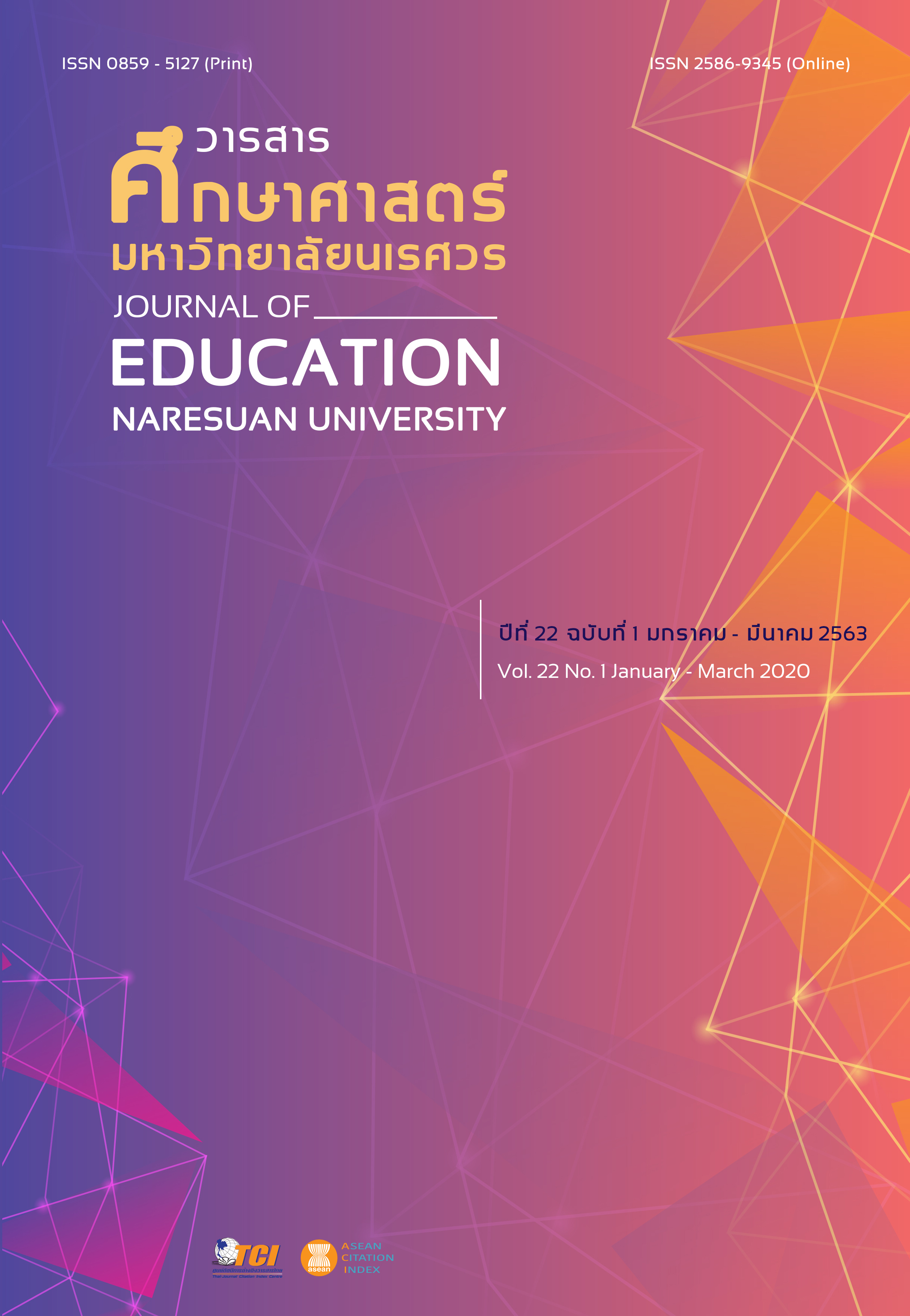A CAUSAL MODEL OF SELF - EFFICACY BY SELF - CONCEPT AND MORAL & ETHICS
Main Article Content
Abstract
The purpose of this research were to develop and validate a causal model of self – efficacy and self – control arising from moral and ethical by influences with empirical data and analyze the characteristic by influence of self – efficacy and self – concept arising from the influence of virtue and ethics. The sample was the
Mathayomsuksa III students in the schools of secondary educational service area office 19 and it was acquired by multistage random sampling. The tool was a questionnaire: 1) self – concept test, 2) morality and ethics test, and 3) self – efficacy test. Statistics used to analyze the data were structural equation analysis (SEM) with the M Plus program. The findings were concluded as follows: The causal model of self – efficacy and self – concept was influenced by students’ virtue and ethics that accorded with the empirical data were (Chi Square = 52.474, df = 38, p-value = 0.0593, Chi Square/df = 1.380, RMSEA = 0.024, CFI = 0.997, TLI = 0.992 and SRMR = 0.020, and 2) Self – efficacy was directly influence by self – concept and virtue and ethics. In addition, students’ self – concept was indirect to influence for self – efficacy through variables of virtue and ethics.
Article Details
The owner of the article does not copy or violate any of its copyright. If any copyright infringement occurs or prosecution, in any case, the Editorial Board is not involved in all the rights to the owner of the article to be performed.
References
Bandura, A. (1977). Self-Efficacy as a determinant of career maturity in urban and high school seniors. Journal of Career Assessment, 5, 191-195.
Cheerachareonpong, S. (2013). Causal factors influencing positive thinking of senior high school students under the secondary educational service area 11. Veridian E-Journal, 6(3), 537-555. [in Thai]
Cheunban, C. (2010). Department of Mental Health suggested Thai people to positive thinking. Retrieved June 16, 2017, from https://www.manager.co.th/Home/ViewNews.aspx?NewsID=9510000132205 [in Thai]
Chongchanin, N. (2016). Factors affecting public intention of St. Louis College students (Master thesis). Bangkok: St. Louis College. [in Thai]
Dechkong, T. (2004, September). Are you good? Matichon, 36 – 39. [in Thai]
Iamsupasit, S. (2007). Theory and techniques of behavioral modification (6th ed.). Bangkok: Chulalongkorn University Press. [in Thai]
Jantarach, P. (2001). Factors affecting self-concept of the non-disciplinary problem student of the secondary school undo the department of general education, Muang District, Ubon Ratchathani Province (Master thesis). Khon Kaen: Khon Kaen University. [in Thai]
Ketumphai, C. (2006). A study of the relationship between some factors and self-regulation to revise the aggressive behavior of Matthayomsuksa 3 students in Chumphon (Master thesis). Bangkok: Srinakharinwirot University. [in Thai]
Limsuknirun, T. (1992). Variables related to moral reasoning among students (Master thesis). Bangkok: Srinakharinwirot University. [in Thai]
Phanmani, A. (2014). Practice to think creatively. Bangkok: Chulalongkorn University Press. [in Thai]
Prasertkul, S. (2008). The comparative study of positive thinking for senior high school students under Nakhonratchasima Educational Service Area VII with different levels of self-concept and life experiences (Master thesis). Bangkok: Srinakharinwirot University. [in Thai]
Saenprasit, K., Ardkaew, J., & Srijumnong, J. (2017). The development a causal model of factors influencing the analytical thinking abilities of the Prathomsuksa 6 students of schools under Loei Primary Educational Service Area Office 1: Multiple group analysis. Journal of Education Naresuan University, 19(2), 167-175. [in Thai]
Sangrawee, A. (2013). Some factors affecting the honesty of lower secondary school students in Nakhon Nayok Province (Master thesis). Bangkok: Srinakharinwirot University. [in Thai]
Tuksino, P. (2016). Model for measurement and evaluation of desired characteristics around National Education Standards and Development of Instrumentation of Attitudinal Structure Basic education (Research report). Khon Kaen: Khonkaen University. [in Thai]
Wanaintarayut, V. (2005). Development of causal models of intelligence emotional intelligence ethical intelligence and intelligence in face and overcoming hurts on student achievement (Master thesis). Bangkok: Chulalongkorn University. [in Thai]
Wattenberg, W. W., & Clifford, C. (1962). Relationships of the self-concept to beginning achievement in reading. Detroit: Wayne State University Press.
Wiratchai, N. (1999). Lisrel model: Statistical analysis for research. Bangkok: Chulalongkorn University Press. [in Thai]


